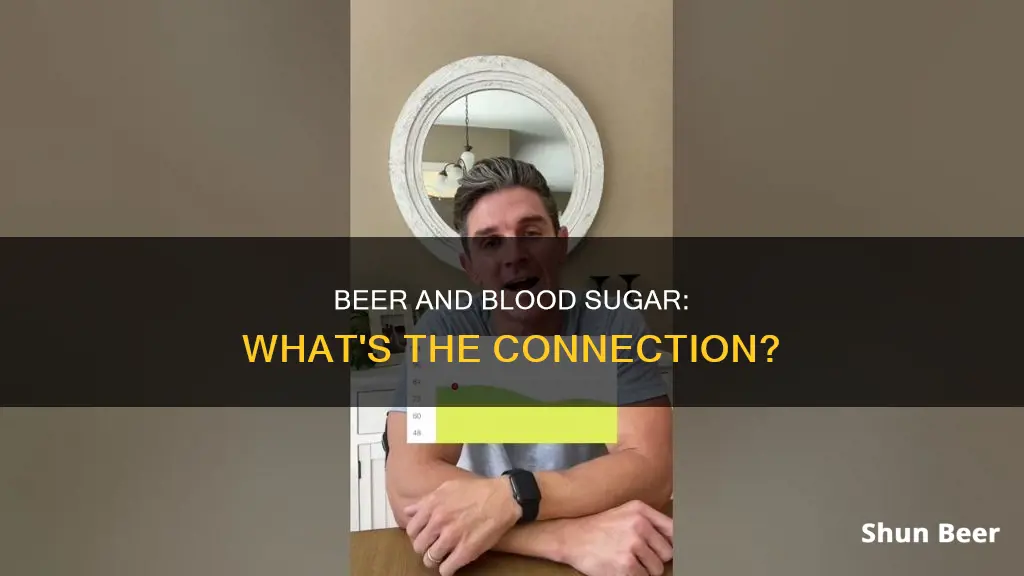
Alcohol can have a significant impact on blood sugar levels, and this effect is particularly notable for people with diabetes. Beer, being an alcoholic beverage, can therefore influence blood glucose levels. Beer contains carbohydrates, which are quickly absorbed into the bloodstream, leading to increased glucose levels. However, excessive beer consumption can also result in reduced blood glucose levels, which can be dangerous for people with diabetes. Understanding the interaction between beer and blood sugar levels is crucial for making informed choices, especially for individuals with diabetes or blood sugar concerns.
| Characteristics | Values |
|---|---|
| Effect on blood sugar levels | Beer can increase blood glucose levels due to its carbohydrate content, which gets absorbed into the bloodstream relatively quickly. |
| Effect on appetite | Alcohol stimulates the appetite, which may lead to overeating and weight gain. |
| Effect on medication | Alcohol may interfere with diabetes medications, making them less effective. |
| Effect on blood sugar regulation | Alcohol interferes with the hormones that regulate blood sugar levels. |
| Effect on other organs | Excessive alcohol consumption can affect the heart, kidneys, and the nervous system. |
What You'll Learn
- Beer contains carbohydrates that are absorbed into the bloodstream, increasing glucose levels
- Alcohol stimulates the appetite, which can lead to overeating and weight gain
- Alcohol can cause hypoglycaemia, especially in people with diabetes
- Alcohol affects the liver's ability to regulate blood sugar
- Alcohol may reduce the effectiveness of diabetes medication

Beer contains carbohydrates that are absorbed into the bloodstream, increasing glucose levels
Beer and other alcoholic drinks can have a significant impact on blood sugar levels, especially for people with diabetes. Beer contains carbohydrates, which are absorbed into the bloodstream relatively quickly, leading to increased glucose levels. This can be problematic for people with diabetes, as their bodies may struggle to regulate blood sugar levels effectively.
The liver is responsible for releasing glucose into the bloodstream to maintain normal blood sugar levels. However, when you drink alcohol, the liver prioritises breaking it down over releasing glucose. This disruption in glucose production can lead to a drop in blood sugar levels, a condition known as hypoglycaemia. Hypoglycaemia can cause various symptoms, including fatigue, sweating, irregular heartbeat, confusion, blurred vision, and in severe cases, seizures and loss of consciousness.
The risk of hypoglycaemia is higher for people with diabetes, especially those using insulin or certain diabetes medications. Alcohol can interfere with the effectiveness of these medications, further disrupting blood sugar regulation. Additionally, drinking alcohol on an empty stomach or without eating food can increase the risk of hypoglycaemia. It is recommended to drink alcohol with a meal or a carbohydrate-rich snack to help maintain stable blood sugar levels.
The effects of alcohol on blood sugar levels can last for several hours after consuming the last drink. Therefore, it is essential to monitor blood sugar levels before, during, and even up to 24 hours after drinking alcohol. For people with diabetes, it is crucial to understand how alcohol affects their blood sugar levels and to consult with a doctor to ensure safe consumption.
While beer and other alcoholic beverages can impact blood sugar levels, the type of beer also matters. Different beers vary in their calorie content, alcohol percentage, and carbohydrate levels. Craft beers, for example, tend to have higher calorie and carbohydrate content than bottled beers. Therefore, choosing a beer with lower alcohol and carbohydrate content can help reduce the load on the body and potentially minimise spikes in blood sugar levels. However, selecting a low-carb beer should not be an excuse to drink more, as excessive alcohol consumption can lead to other health issues.
Best Low-Sugar Beers: The Sweetness Spectrum
You may want to see also

Alcohol stimulates the appetite, which can lead to overeating and weight gain
Alcohol can have a significant impact on blood sugar levels, and this is a particular concern for people with diabetes. When you drink alcohol, your liver is busy breaking it down, which interferes with its ability to release glucose into the bloodstream. This can cause blood sugar levels to drop, leading to hypoglycaemia, especially if you drink on an empty stomach. Alcohol also stimulates the appetite, which can lead to overeating and weight gain.
Several studies have found that alcohol increases hunger and appetite. In tests on mice, alcohol activated brain signals that told the body to eat more food. The mice ate more than usual, and when researchers blocked these signals, the mice did not overeat, suggesting that alcohol directly influences the part of the brain that controls appetite. Alcohol also has an impact on hormones that control satiety, or feeling full. It may inhibit the effects of leptin, a hormone that suppresses appetite, and glucagon-like peptide-1 (GLP-1), a hormone that inhibits food intake.
With alcohol lowering inhibitions and impairing judgement, people are more likely to eat more than usual and make less healthy food choices. Alcohol also has a lot of calories and, combined with the extra food often consumed when drinking, this can lead to weight gain. Alcoholic drinks are often high in carbohydrates, which can also raise blood sugar levels.
For people with diabetes, the risks are even greater. Alcohol can interfere with diabetes medications, and the symptoms of low blood sugar can be similar to those of alcohol intoxication, making it hard to recognise if blood sugar levels have dropped dangerously low.
Beer and Blood Sugar: What's the Connection?
You may want to see also

Alcohol can cause hypoglycaemia, especially in people with diabetes
Firstly, the liver is responsible for both releasing glucose (sugar) into the bloodstream to maintain normal blood sugar levels and breaking down toxins like alcohol. When alcohol is consumed, the liver prioritises breaking down alcohol, which inhibits its ability to release glucose. This disruption can lead to a drop in blood sugar levels, especially if the person has not eaten enough food. The risk of hypoglycaemia is higher when drinking on an empty stomach or when blood sugar levels are already low.
Secondly, alcohol can interact with certain medications, including insulin and diabetes medications like sulfonylureas, which increase insulin production. When combined with alcohol, these medications can cause a further decrease in blood sugar levels, increasing the risk of hypoglycaemia. It is crucial for people with diabetes who are taking these medications to consult their doctor before consuming alcohol.
Additionally, alcohol can affect the body's ability to regulate blood sugar levels for several hours after consumption. This prolonged effect means that hypoglycaemia can occur even after the person has stopped drinking, especially if they have been exercising. The risk of hypoglycaemia increases with the number of drinks consumed, and it is recommended that people with diabetes drink in moderation and always with food.
Furthermore, the symptoms of hypoglycaemia can be similar to those of alcohol intoxication, making it challenging to distinguish between the two conditions. This overlap in symptoms can delay the recognition and treatment of hypoglycaemia, potentially leading to severe health consequences.
Finally, alcohol consumption can worsen diabetes-related complications such as disturbances in fat metabolism, nerve damage, and eye disease. Therefore, it is essential for people with diabetes to carefully consider the risks associated with alcohol consumption and consult their doctor to determine if it is safe for them to drink.
Best Sugar-Free Beers: Enjoy Guilt-Free Sipping
You may want to see also

Alcohol affects the liver's ability to regulate blood sugar
When you drink alcohol, the liver has to choose between breaking down alcohol and releasing glucose. It ends up prioritising breaking down alcohol, which means it stops releasing glucose. This can cause your blood sugar levels to drop too low, a condition known as hypoglycaemia. The risk of hypoglycaemia is higher when drinking on an empty stomach, and it increases with each additional drink.
The liver takes about 1 to 1.5 hours to process each alcoholic drink. During this time, you may be at risk of low blood sugar. The risk can be lowered by drinking with food. If you've had alcohol close to bedtime, it's recommended to test your glucose level, and if it's low, to consume a carbohydrate-rich snack before bed.
Alcohol can also cause blood glucose levels to rise, especially after a large meal with a lot of alcohol. Alcoholic drinks are high in sugar, which can cause a spike in blood sugar levels. Once the maximum amount of sugar in the alcohol has been absorbed, the body releases insulin to bring the blood sugar level down.
Beer and Sugar: What's the Connection?
You may want to see also

Alcohol may reduce the effectiveness of diabetes medication
Secondly, alcohol can interfere with the effects of oral diabetes medications and insulin. This is because alcohol prevents the liver from turning proteins and fats into carbohydrates when the body needs energy, such as during exercise or between meals.
Thirdly, alcohol stimulates your appetite and can affect your judgement, leading to overeating and disrupting your blood sugar control. Alcoholic drinks are often high in calories, making it harder to lose weight. This can make diabetes more difficult to manage.
Finally, drinking alcohol can make it easier to mix up your medications or forget to take them altogether.
Sugar Secrets: Priming Beer with Precise Sugar Grams
You may want to see also
Frequently asked questions
Beer contains carbohydrates, which are absorbed into the bloodstream relatively quickly, leading to increased glucose levels. Beer can also affect your blood sugar levels up to 12 hours after consumption.
Drinking beer can cause your blood sugar to drop very low, a condition known as hypoglycemia. It can also increase your risk of weight gain and affect your diabetes medications.
It is recommended that men with diabetes limit themselves to no more than two alcoholic drinks per day, while women should not consume more than one drink per day.
Symptoms of low blood sugar include lightheadedness, dizziness, lack of coordination, irregular heartbeat, fatigue, sweating, confusion, blurred vision, and seizures.
Yes, light beers, dry wines, and seltzers are lower in carbohydrates and may be better options for people with diabetes. However, it is still important to drink in moderation and monitor your blood sugar levels.







